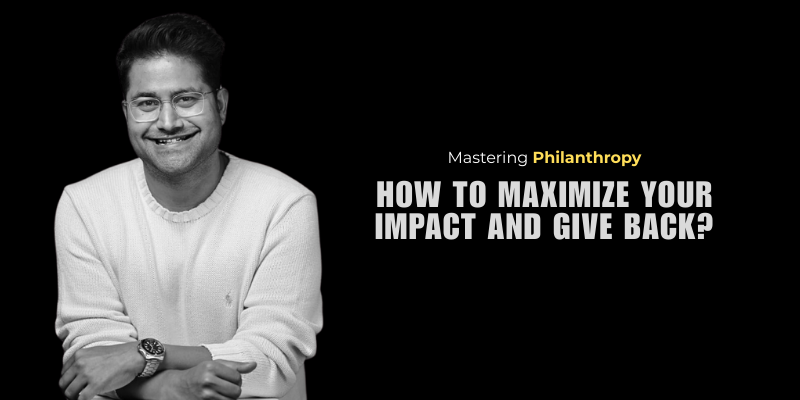7 Key Steps to Becoming a Successful Philanthropist
- Rahul Dasgupta
- Mar 7
- 4 min read
While philanthropy is frequently associated with charity, this is not totally right. While charity is a one-time act, philanthropy is a commitment to making a long-term influence on society. Philanthropy is the commitment of resources, time, and passion to a cause with the goal of changing people's lives and creating a beneficial ripple effect. But what does it take to leave a legacy of generosity? Here are crucial approaches to help you become a successful philanthropist.
Building a Legacy of Generosity: Steps to Becoming a Successful Philanthropist
I, Rahul Dasgupta, believe that true philanthropy goes beyond donations—it’s about creating lasting change and empowering communities. As an entrepreneur and corporate leader, I have always been passionate about using my resources to make a meaningful impact on society. My philanthropic journey has been driven by a commitment to education, skill development, and social welfare, ensuring that underprivileged individuals have access to opportunities that can transform their lives. Through scholarships, community-driven initiatives, and strategic giving, I strive to build a legacy of generosity that inspires others to give back. For me, philanthropy isn’t just an act of kindness; it’s a responsibility to create sustainable solutions that benefit future generations.

Define Your Purpose
The concept of becoming a philanthropist begins with a vision: a goal to bring about change in society. This vision offers the purpose. As a result, the first step in becoming a successful philanthropist is to articulate your vision and purpose. Think about what really connects with you. Is it providing education to slum children, fighting poverty, promoting animal rights, or improving healthcare?
Identifying your passion allows you to focus your efforts on issues that are in line with your beliefs and have the most effect. Take some time to learn about the issues that are most important to you. Attend social events, interact with like-minded people, and read widely. This will assist you in determining what is going on in your area, where you may start, and the resources you will require to begin your journey.
Start Small but Dream Big
Although philanthropy implies giving back, what is ultimately important is the intention behind the contribution. You don't have to be a millionaire to be a philanthropist and have an impact. You may always begin modestly by providing small contributions in the form of money, time, expertise, or knowledge. You must have the proper intention to help the community.
Begin by volunteering for the cause(s) that pique your interest. Doing so will help you grasp the notion of generosity before digging more into it. Remember that every tiny action serves as the groundwork for greater initiatives in the days to come.
As your philanthropic journey expands, create ambitious yet realistic objectives. Dreaming large does not imply pushing your assets; rather, it means deliberately scaling your influence over the years.
Develop a Strategic Plan
Hustling can be fantastic, but long-term success requires strategic planning. Every philanthropic effort needs an organized approach, so developing a well-thought-out plan is critical. Clearly state your aims, identify those who are to benefit, and specify the ways of contributions, among others. Remember that effective philanthropy operates similarly to business, with careful planning and ongoing evaluation.
Foster Network
To create a legacy of generosity you must spread the word about what you are doing and influencing people by sharing your journey. The best way to do this is through fostering networks with like-minded people, and organizations who share similar visions and intentions. Encourage them to contribute in their own ways. Through meaningful networking, you can create a ripple effect of positive change that endures well beyond your lifetime.
Measure Your Impact
Successful philanthropy is data-driven. Regularly evaluate the outcomes of your initiatives in order to determine what works and what doesn't. Metrics such as the number of lives affected, progress in specific areas, and long-term social advantages can be used to assess performance. Collecting feedback from consumers and partner organizations may also be quite beneficial in this respect, as it can be utilized to improve your strategies and make informed decisions regarding future contributions.
Educate Yourself Continually
The world around us is always changing, with fresh challenges emerging and old ones reoccurring. As a result, it is critical to keep current on trends, standards of excellence, and new requirements in the philanthropic sector. Attend classes, conferences, and webinars to expand your knowledge and abilities. You can also seek one-on-one mentoring from experienced philanthropists who can help you navigate challenging decisions. Never stop learning.
7. Lead with Empathy and Humility
Empathy is important to philanthropic endeavors. Remember that it is not how much you donate that matters, but the motive behind it. Before diving into philanthropy, it is critical to have the attitude to understand the needs of the people you serve by connecting with them directly. Listen to their experiences, issues, and hopes. This not only guarantees that your efforts are focused on their requirements, but it also promotes mutual respect and trust. Furthermore, bear in mind that your efforts are just one element of a larger effort to make the world a better place.
Conclusion
Building a lasting legacy in philanthropy is a gratifying process that needs vision, perseverance, and ongoing development. You may generate long-term change by identifying your mission, starting small, planning, assessing impact, and cultivating a giving culture. Remember that giving back is more about the heart and intention than the size of your offerings. With each act of kindness, you not only change people's lives, but you also create a legacy that will inspire future generations.


Comments